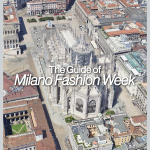
Rinascente and the paradox of the e-commerce
How one of Milan's oldest stores has faced the lockdown without an e-commerce website
May 29th, 2020
nss magazine
Over the last few months, nss magazine has often reported on how e-commerce websites and services have become essential and vital for brands and stores not only for their survival during the lockdown but they've also stood out as important factors for the brand reputation and brand value. An exception in this sense is Rinascente, the historic Italian department store - acquired in 2011 by the Thai group Central Group - that has faced these weeks of pandemic without an e-commerce site.

As CEO Pierluigi Cocchini stated, e-commerce was a project in the works even before the pandemic, so much so that the launch was initially scheduled for March. With the end of the lockdown, Rinascente will open its first e-commerce in June, as soon as internal tests are over.
It should, however, be underlined that despite the lack of a real site to shop on, Rinascente has always taken advantage of the On-Demand service. This is an instant messaging proposal, directly on WhatsApp, that allows customers to get in touch with the store's personal shoppers, who help the customer in the search and purchase of the requested product, which will then be shipped home. A solution that has been highly appreciated and which has generated €5 million in sales.
It might seem strange that a retailer of this level - with 9 stores across Italy, that generated 900 million net sales last year, welcoming over 21 million visitors - does not have an e-commerce site. But it is already these numbers that reflect a business model that works, and a lot, in the store, and that relies precisely on direct contact with customers. Rinascente has repeatedly defined itself as a house of brands (it hosts more than 700) and has made customer management one of its strengths, building a direct and less intimidating relationship with it. Cocchini has often said that Rinascente wanted to erase that priestly and solemn atmosphere that reigns in single-brand boutiques, doing without the plastered security that opens the door to a customer in awe. It also wanted to achieve a certain degree of visibility and recognizability, especially among a new type of customer, younger, international and with different interests, before the e-commerce was put online.
If you look at the numbers registered during the last Black Friday (85 thousand people welcomed and over 8.5 million of goods sold), you realize that the store continues to be an important reference point for a wide client base, which when it comes to the demographic has come very close to young men who are interested in fashion, both classic and streetwear.
Then there is another important issue to take into consideration, that of tourism. In particular in the stores in Milan, Rome and Florence, tourists have become an extremely strategic asset, in particular, those from Asian countries, such as China, Japan and Korea, and that are lacking in these first days of reopening. Precisely for this reason, an e-commerce website would have been useful during the lockdown weeks, it could have somehow curbed the losses caused by the absence of tourists and the closure of the stores.
In any case, Rinascente's success proved strong against the trend that, according to many, will mark the end of the department stores as we know them today. The crisis that has already hit American institutions such as Neiman Marcus - who has already declared bankruptcy - Nordstrom and even before Barney's, will only be exacerbated and further accelerated in a probably irreversible way by the changes and new shopping habits that the pandemic has generated. Rinascente model seems to move in the opposite direction, further strengthening its importance (and its revenues) inside its stores.
Rinascente reopened last week with strong promotions and many discounts, and although the flow of customers has not been very high, the receipts have registered important purchases. In addition to e-commerce, the store also plans to renovate the two floors dedicated to women collections in the Milan store, while other renovation plans will affect the stores in Florence and Rome in the coming months.





















































